 |
Cannon Iron Foundries Limited
Deepfields, Coseley |
 |
|
The company was founded by
Edward and Stephen Sheldon in 1826, on a piece of
land, known as 'The Dowry', that been purchased from
the Turton family. John Turton gave the land to his
daughter Elizabeth in 1807. The company was
initially known as Edward & Stephen Sheldon &
Company Limited. The piece of land was ideally
located for such a business, lying alongside the
Birmingham Canal, next to many adjacent collieries.
For around 100 years, the company purchased pig iron
from the neighbouring Prioryfield Furnaces.
The opening of the Coseley
Tunnel and the completion Telford’s mainline canal
in 1838 must have greatly helped the business.
Products initially consisted of cast iron pots and
pans, which were very popular at the time.
The foundry initially covered
nearly half an acre and employed between 15 and 20
people. The products sold well and expansion
followed. Some time in the 1840s, Stephen Sheldon,
who was the junior partner, left the business,
leaving Edward solely in charge.
|
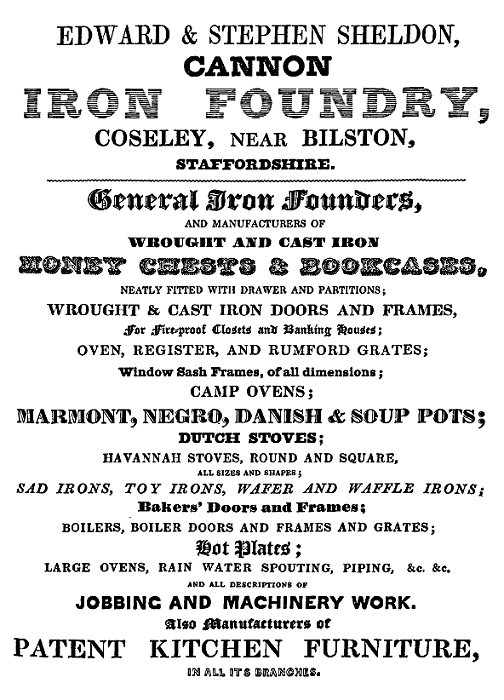
An advert from 1842.
| On 1st April, 1853, Edward died,
and the business was carried on by his sons-in-law,
William Barnett and John Hawthorne. In January 1855
the name was changed to the ‘Executors of the late
E. Sheldon’, then in June 1860, company director
William Barnett, took the decision to change the
name to E. Sheldon & Company. In May 1884 the
business became a private limited company with a
capital of £50,000 and became Cannon Hollowware &
Company Limited. The shares were held only by the
partners, who were all family members. |
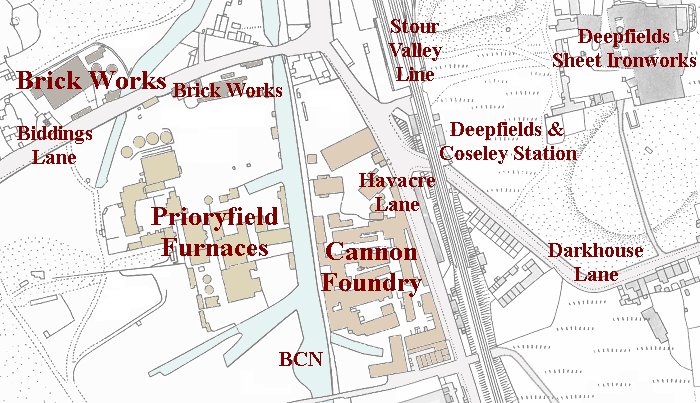
The site of the original
factory.
|
The product range was
greatly extended to include kettles, preserving
kettles, pots, saucepans, and stewpans. The
products were made in large numbers and
distributed throughout much of the world. The
products were continuously improved and many
patents were taken out. Items were given a
porcelain enamelled or a tinned finish. The
enamelled products were sold under the
‘Porceliron’ name. Saucepans were fitted with
patented hexagonal handles, known as ‘F.G.’,
meaning firm grip.
Steam-powered automatic
presses and tools were used, and the japanning
shop, where the exterior of various products was
given a japanned finish, had two tiers of drying
stoves, each holding between 400 to 500 pots and
pans. There were five floors in the warehouse,
each having a weekly output of over 5,000
saucepans alone.
In the 1840s the foundry
began to produce Cannon brand Colonial castings
that were sold in Africa, South America, the
West Indies and the Far East. The vast product
range included a wide range of cooking pots,
camp ovens, Havana stoves, baking pots, cassada
plates, rice bowls and rice pans. One of the
larger products was a huge three-legged pot with
a capacity of 140 gallons, for palm oil boiling.
It was sold to the West African market.
|
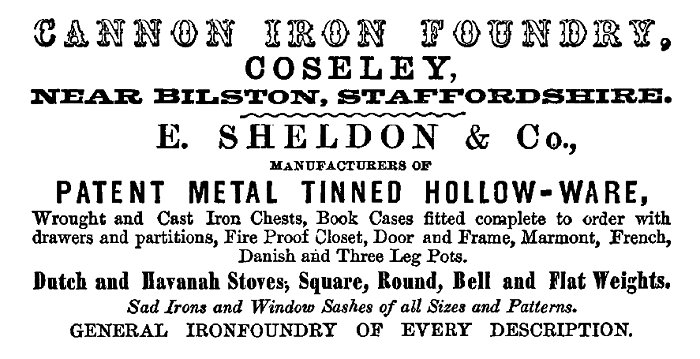
An advert from 1865.
| In 1894, the company formed its own fire
brigade, made-up of members of staff. The first
Captain of the brigade was W. H. Hawthorne, a
company director. On the 8th May, 1895, the
brigade faced a huge challenge when a large fire
occurred at the Deepfields site. It destroyed
the warehouse and most of the stock, and caused
around £5,000 worth of damage. The blaze was
brought under control by the Cannon fire
brigade, and fire brigades from Bilston, Dudley,
Tipton and Wolverhampton. In 1895, Cannon purchased
the business of Richard Hickman, a grindstone
manufacturer, and opened a grindstone
department, producing Cannon ‘Excelsior’,
‘Little Wonder’, ‘Standard’ and ‘Universal’
grindstones, as well as glass cutting stones. |
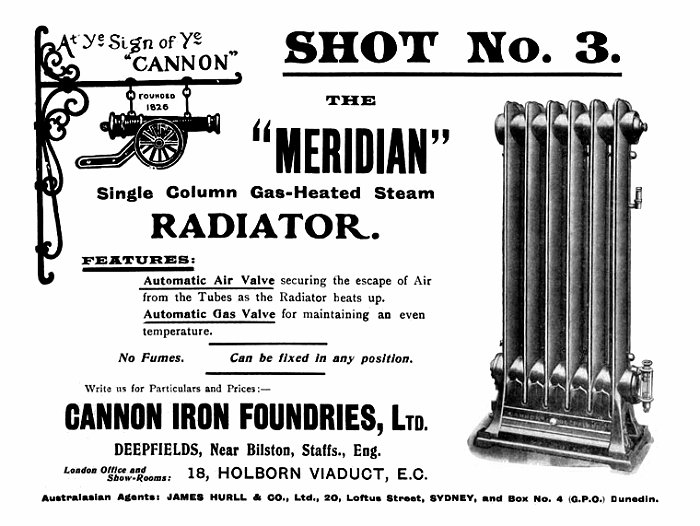
An advert from 1909.
|
In 1900, the firm became
‘Cannon Iron Foundries Limited’, to reflect the
wider range of its business, which included
Cannon sad irons, cast iron door hinges, axle
pulleys, and even dumb bells for keep fit
enthusiasts. Richard Clayton, who lived at
Coseley Hall, became Chairman and Managing
Director. By 1902 the firm had around 700
employees, including 40 clerks.
The ‘Porceliron’ trade mark
was also used for a wide range of enamelled
sanitary ware, including baths, toilets,
urinals, showers and foot baths, which all sold
extremely well. Products were also developed for
the chemical industry including autoclaves,
boilers, bowls, condensers, crystallisers,
digesters, evaporating pans, stills, and tanks.
The firm even produced ‘Cannon Cast Iron Quartz
Crushing Mortars, which were exported to the
goldfields in Australia and South Africa.
In 1905 the firm began to
manufacture gas meters in London, after
acquiring William Smith of London, a long
established gas meter manufacturer. The business
rapidly grew and large numbers were sold at home
and abroad. By 1914, the firm employed about
1,000 people and by 1926 the site covered 26
acres.
Cannon also became well
known for its gas fires, which were produced
from the early years of the 20th century and
became a
great success. The fires were finished with a
new patented enamelling process called ‘Vitro
Lustre’ that was extremely durable and
unaffected by the heat. Cannon also produced
gas-heated radiators. |
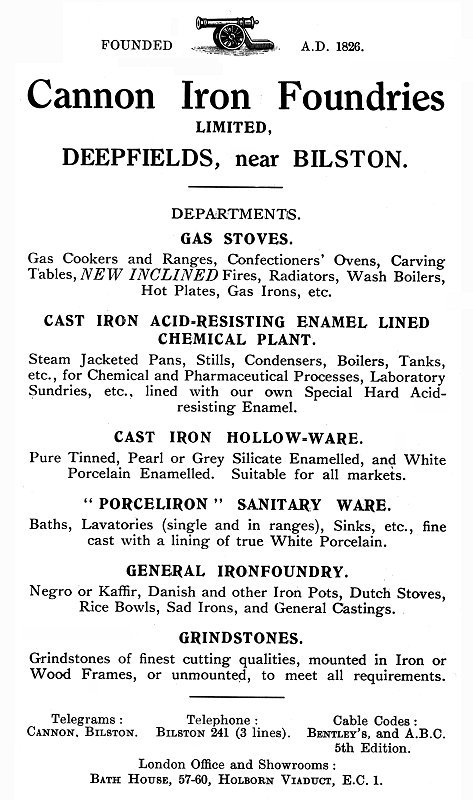
An advert from 1929.
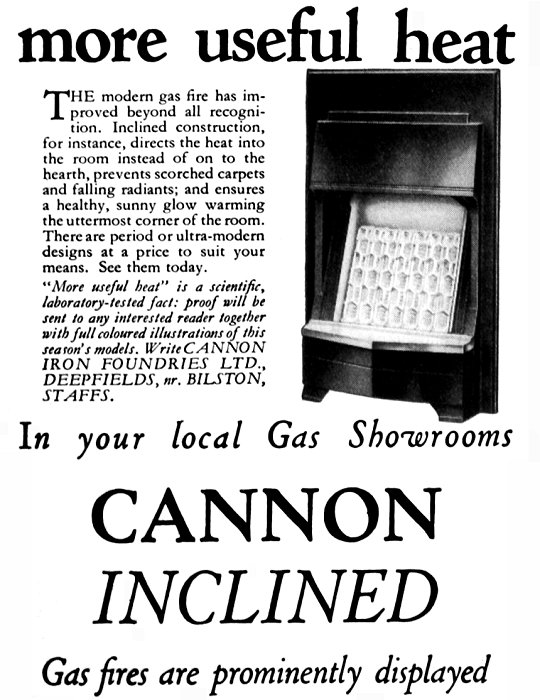
An advert from 1934.
|
Cannon gas cookers became a
household name and were sold in vast quantities.
The first gas cooker left the factory in 1895.
At that time the gas stove department covered
300 square yards and grew so rapidly that by
1926 it covered 12 acres. This was made possible
because a new works was built to the east of the
railway line. The new factory, which opened in
1906, had the most up-to-date machinery and
extensive warehouses. Other products produced in
the new factory included bathroom geysers,
boiling rings, breakfast grillers, cooking
ranges, carving tables, hot closets for hotels
and schools etc., laundry irons, gas-heated
steam radiators, tailor’s heaters, washing
boilers, and water circulators.
|
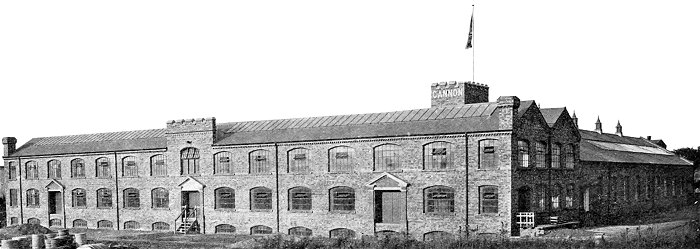
The new buildings
for the gas stove department, were erected in 1906 on six acres of land. From Cannon's
September 1915 Illustrated General
Catalogue. At the front is the warehouse,
with the fitting shops behind on the right. |
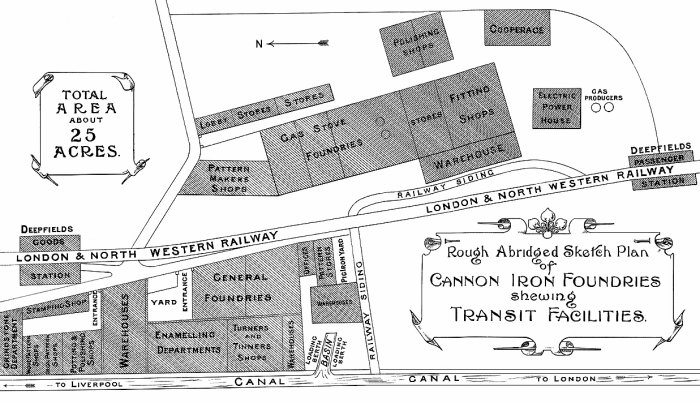
A plan of the old and
new works at Deepfields from a Cannon
catalogue of gas cookers, gas heating stoves
and gas meters etc., produced in about 1906. |
|
The opening of the new
factory coincided with the Cannon’s 80th
anniversary and so a celebration dinner was
held, at which a toast was drunk to the new
works.
One of the most popular of
the early gas cookers was the ‘Hercules’, which
efficiently used gas for baking, grilling and
roasting etc.
The company also introduced the
‘Chef’ cooker which was enamelled in dark green.
There were also ‘penny in the slot’ cookers and
the top of the range ‘Grosvenor’.
On Saturday 18th September,
1926, the company celebrated its centenary with
an excursion to Blackpool and a celebration
dinner.
Two trains carried 850 members of staff
to Blackpool, where they had an enjoyable day.
The celebration dinner was held in the Indian
Lounge at the Blackpool Winter Gardens.
|
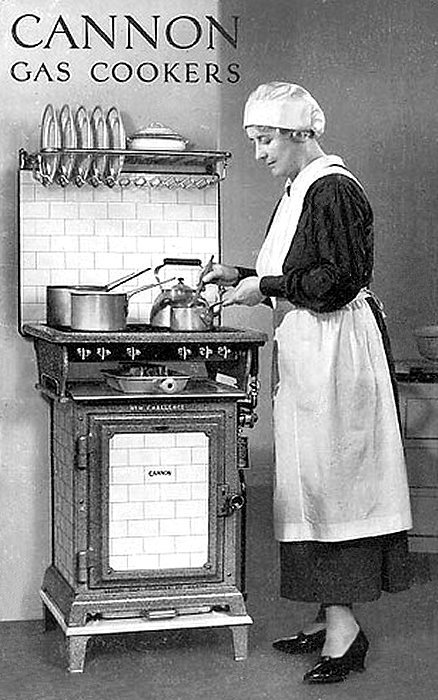 |
|
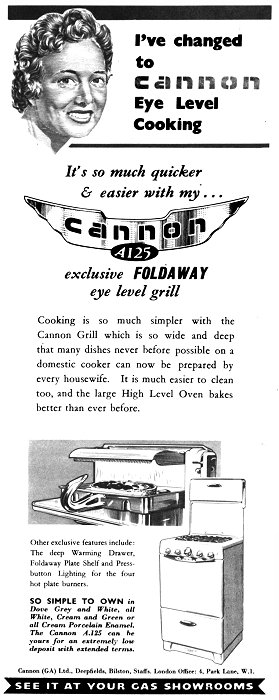
An advert from 1954. |
In the mid 1930s, the
company was incorporated and changed its name to
C.I.F. Investments Limited, on the 8th March,
1935. The name was then changed to Cannon Industries.
By the late 1930s, the
company’s products included the ‘Champion’ and
‘New Challenge’ gas cookers and the ‘Autimo’
inclined gas fire along with a range of portable
heaters and radiators. In 1952 the company changed
its name to Cannon (Holdings) Limited, and in
the following year, two subsidiary companies
were formed, Cannon (GA), gas appliance sales
and service, and Cannon (CP), chemical plant
sales and service. The subsidiaries were formed
when Cannon acquired the uneconomical Midland
Steel Company, which was closed. In 1959, Cannon
introduced ‘Power Maid’ multi-purpose kitchen
appliances, under a licence from the USA.
In the 1950s, Cannon became
one of the country’s leading manufacturers of
gas cookers and gas heaters. It was the first
company to introduce eye-level foldaway grills.
In 1964, GEC took over
Cannon Holdings Limited and in 1987, became part
of General Domestic Appliances, a joint venture
company owned by GEC and GE of America in 1987.
In 1993, Cannon's manufacturing facility and
offices moved from Coseley to Blythe Bridge,
Stoke-on-Trent.
The original foundry has
since been demolished and houses have been built
on the site. The later development on the other
side of the railway has been transformed into
Cannon Business Park, where a large number of
businesses are based. A few of the old
outbuildings still survive and have been sold to
various businesses. |
|

|
|
Return to the list
of
companies |
|